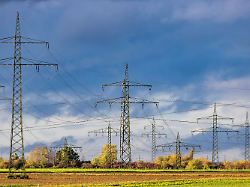Price cap and network fee
Cabinet wants to relieve consumers of energy costs
November 1, 2023, 5:54 p.m
Listen to article
This audio version was artificially generated. More info | Send feedback
With two concrete measures, the federal government wants to protect citizens from a possible further increase in energy costs next winter. As a precautionary measure, the price controls for electricity and gas should be extended. In addition, the increase in network fees should be cushioned.
The federal government wants to relieve consumers of energy prices with two measures. The federal cabinet introduced a legal change to curb electricity prices with a billion-dollar subsidy for network fees. On the other hand, it passed an ordinance to extend the gas and electricity price brake until the end of April 2024. The EU Commission still has to agree to this. A spokesman for Federal Economics Minister Robert Habeck spoke of a stockpiling decision. The ministry is in intensive discussions with the EU Commission in order to move the process forward as quickly as possible.
So far, the gas and electricity price brakes are limited until the end of the year and could be extended at the end of April 2024 by a legal ordinance from the federal government with the approval of the Bundestag. The regulation states that the energy crisis has eased thanks to various measures taken by the federal government and that the situation on the energy markets has stabilized since last winter. However, unexpected risks could still arise, especially with regard to the ongoing Russian war of aggression against Ukraine.
CDU energy politician Andreas Jung complained that the traffic light puts the extension of the energy price cap in the window and increases energy costs in the same winter through an early return to the increased VAT. According to government plans, the tax cut on gas will expire three months earlier than planned at the turn of the year. “The brakes probably won’t work for many consumers, but the higher VAT certainly will,” he said.
According to calculations by the comparison portal Verivox, households on average would hardly benefit from an extension of the energy price brakes given the VAT increase on gas. The Federal Association of Energy and Water Industries and the Association of Municipal Companies see a timely and comprehensive implementation of the longer energy price brakes by municipal utilities and energy suppliers as of January 1, 2024 at acute risk. There is no approval from the EU Commission; the approval of the Bundestag could take until mid-December. This meant that utilities and municipal utilities only had two weeks over Christmas to adapt billing systems and inform customers.
Network operators announce price increases
In addition, the federal government wants to contribute up to 5.5 billion euros to the transmission network costs. The money will come from the economic stabilization fund, as the Ministry of Economic Affairs announced. The energy price brakes are also financed from this fund. The subsidy would stabilize network fees, which would reduce the price of electricity and benefit all consumers, said government spokesman Steffen Hebestreit. According to the ministry, the subsidy is subject to budgetary consideration in the course of the parliamentary procedure for the 2024 federal budget.
The four transmission system operators Amprion, 50Hertz, Tennet and TransnetBW announced in October that the nationwide usage fee for electricity transmission in the overland transport network should increase slightly in the coming year. The expected federal subsidy was already taken into account. Transmission network costs – or network fees – are a type of fee for the use of the line and power supply network that are charged by the local electricity network operator. The network fee finances the operation and expansion of the networks.
